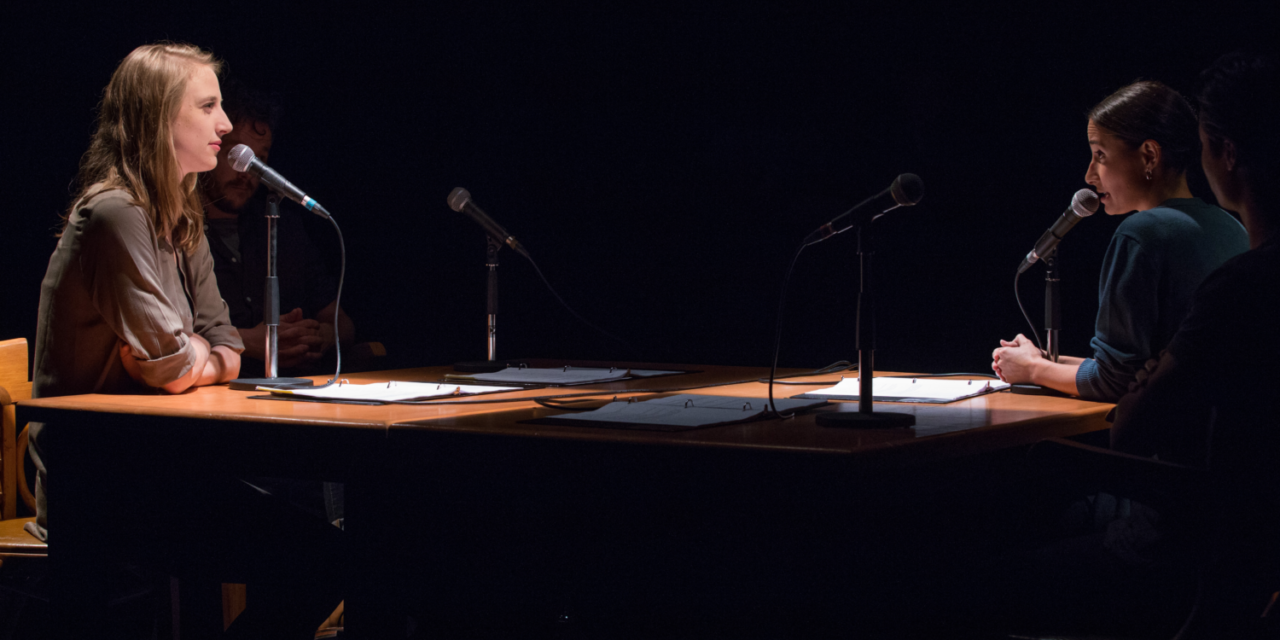Following the production of The Boy in the Moon, put on by the 1000 Islands Playhouse in August, Ellie Moon’s docudrama Asking For It is the second production at this theatre to broach a more difficult topic. This effort by TIP to branch out thematically in its choice of productions should be applauded, given its status as a magnet for tourists to the Gananoque and 1000 Islands region. Exposing theatre-goers to plays which deal with serious topics and issues helps restore the teaching function back to the art form – theatre, after all, is ideally meant to both delight and instruct. And the subject matter of Asking For It, directed by Carly Chamberlain for this production, is one which could not be more relevant: how sexual consent and assault are understood in today’s society. Conceived of in the wake of the scandal involving former CBC radio host Jian Ghomeshi, Moon’s piece largely takes the form of interviews conducted with both friends and strangers about consent and their own perspectives on the matter.
The majority of these interviews are re-enacted in the first act, with a set up consisting of a table, four chairs, microphones, and scripts. Beginning with a broadcast of the tweet by Ghomeshi himself which revealed his firing by the CBC in 2014 for personal misconduct, Moon (playing herself) introduces the impetus for her project and then proceeds onto the interviews. Those she enlists for the show’s material are portrayed at turns by three other actors (Geoffrey Armour, Michael Chiem, and Brittany Kay). Moon is suitably smooth and poised as she questions her subjects, while the remaining three give credible performances as the interviewees and additional characters who appear throughout the play.
Although inspired by the Ghomeshi scandal, the concerns of the MeToo movement certainly intersect with Asking For It; though the play does not deal with workplace sexual harassment specifically, it places aggressive sexual practices between (straight) couples in private under a magnifying glass. As the viewer soon discovers, however, there is no universal criterion for determining how much aggression is too much in the bedroom. Indeed, the most important lesson of the play is that sexual consent is inherently shrouded in ambiguity and subject to the notions of the partners at hand. This apparent truth is displayed during nearly every conversation or interview that Moon has with another character, as each express divergent attitudes towards the responsibilities of men and women in ensuring that consent is respected.
The starkest clashing of perspectives arguably occurs when Moon interviews the police officer boyfriend (Armour) of one of her own acquaintances. Reacting defensively to the goal of Moon’s project, the officer accuses it of being biased in its favoring of women’s experiences. Yet the officer also brings up two points which merit further thought: that the humanity of men who abuse should be acknowledged, as well as the sufferings of male rape victims (which are often unreported). Though these sentiments are admittedly voiced in a confrontational manner, they add a dimension of nuance to the issue of sexual assault. Such nuance in considering men’s experiences is helpful, given that much of the conversation around consent in popular culture and the media has focused on women almost exclusively in opposition to men.
Ultimately, Moon’s play is a refreshing experience due to its acceptance that easy answers cannot be found in the debate about consent. The note by Chamberlain in the program phrases it eloquently: “Asking For It is a provocation, a dialogue, an investigation, an invitation.” Thus, it is only the starting point of a complex and further discussion into an important matter – and a very welcome one at that.
This article was published in Capital Critics Circle by Natasha Lomonosoff on September 16, 2019, and has been republished with permission.
This post was written by the author in their personal capacity.The opinions expressed in this article are the author’s own and do not reflect the view of The Theatre Times, their staff or collaborators.
This post was written by Natasha Lomonossoff.
The views expressed here belong to the author and do not necessarily reflect our views and opinions.


















